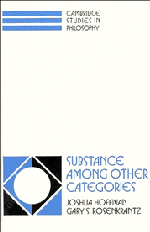Book contents
- Frontmatter
- Contents
- Acknowledgments
- Introduction
- 1 Substance and other categories
- 2 Historically prominent accounts of substance
- 3 Collectionist theories of substance
- 4 The independence criterion of substance
- 5 Souls and bodies
- Appendix 1 The concrete–abstract distinction
- Appendix 2 Continuous space and time and their parts: A defense of an Aristotelean account
- Index
1 - Substance and other categories
Published online by Cambridge University Press: 18 September 2009
- Frontmatter
- Contents
- Acknowledgments
- Introduction
- 1 Substance and other categories
- 2 Historically prominent accounts of substance
- 3 Collectionist theories of substance
- 4 The independence criterion of substance
- 5 Souls and bodies
- Appendix 1 The concrete–abstract distinction
- Appendix 2 Continuous space and time and their parts: A defense of an Aristotelean account
- Index
Summary
First philosophy, according to the traditional schedule, is analytic ontology, examining the traits necessary to whatever is, in this or any possible world. Its cardinal problem is that of substance and attribute.
D. C. Williams Principles of Empirical Realism 74 (1966)[Categories are] … the different kinds of notions corresponding to the definite forms of existence… an enumeration of all things capable of being named, the most extensive classes into which things could be distributed.
“Category” Oxford English Dictionary (1971)STATEMENT AND DEFENSE OF OUR PROJECT
Metaphysics has often been revisionary, and less often descriptive. Descriptive metaphysics is content to describe the actual structure of our thought about the world, revisionary metaphysics is concerned to produce a better structure.
P. F. Strawson Individuals 9 (1959)One of the main projects in this book is to conduct a conceptual investigation of the notion of an individual substance as ordinarily understood, paradigm instances of which seem to be particular material objects and persons. In one of its ordinary senses, the term ‘thing’ means individual substance. For example, the term ‘thing’ is being used in this sense in the following sentences:
‘Wisdom is not a thing, it is a quality of a thing’.
‘Surfaces and holes are not things, they are limits and absences of them, respectively’.
‘A chameleon's turning color is not a thing, it is a change in one’.
- Type
- Chapter
- Information
- Substance among Other Categories , pp. 5 - 28Publisher: Cambridge University PressPrint publication year: 1994



